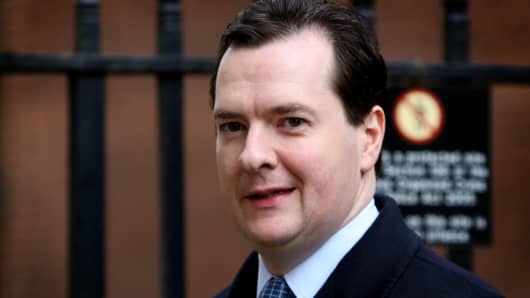Britain's finance minister George Osborne unveiled his plans for another round of government spending cuts on Wednesday as he tried to keep his deficit reduction drive on track despite stiff opposition to his policies.
Osborne unveiled details of 11.5 billion pounds ($17.7 billion) of spending cuts during a parliamentary speech in London. The cuts will take effect in the 2015/2016 fiscal year, when national elections are due in the U.K.
Spending on international aid, health and education was protected but all other departments were asked to offer cuts of 8 to 10 percent of their budgets.
Osborne said that the U.K.'s deficit was down by a third, that a record number of people were in work and that the economy had returned from the brink of bankruptcy, to heckles from the opposition Labour party politicians.
In a speech focusing on families and education, business and infrastructure, Osborne said that the government was committed to the U.K.'s economic recovery and would make further investments in infrastructure, enterprise, science and education, announcing a 300 billion pound spending program until the end of decade.
One hundred billion pounds worth of infrastructure projects will be announced on Thursday, he said.
The speech follows weeks of tense negotiations between the finance ministry and government ministers trying to protect their departments from cuts. Osborne said the spending round was part of his plan to move Britain "from rescue to recovery."
Osborne told parliament it was not possible to reduce the deficit without asking everyone to take part, but that those with the broadest shoulders should bear the brunt of cuts. "We will not make our children pay for mistakes made in the past," he said.
Economists and former politicians expressed mixed views in response to the spending review.




